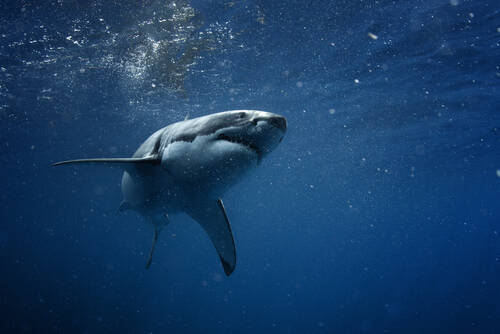
A woman lost her life and a man was seriously injured in a shark attack during an early morning swim at a beach in Crowdy Bay National Park, located on Australia’s east coast, according to local law enforcement. The park, a popular destination for beach camping, fishing, and hiking, is situated approximately 224 miles north of Sydney. Shark attacks on multiple individuals are considered rare, experts note.
Following the incident, beaches in the vicinity and further north were indefinitely closed to swimmers, as stated by Police Chief Inspector Timothy Bayly. Emergency services were alerted to the situation at Kylies Beach after receiving reports that two individuals in their mid-20s had been attacked by a shark around 6:30 a.m. Bayly refrained from providing specific details about the injuries or the circumstances surrounding the attack.
Bayly did confirm that the victims were acquainted and had been swimming when the shark attacked. A bystander on the beach provided initial assistance to the victims before paramedics arrived. Unfortunately, the woman succumbed to her injuries at the scene. The man was airlifted to a hospital, where paramedic Josh Smyth reported his condition as serious but stable.
Smyth praised the bystander’s quick thinking and first aid efforts, which he believes may have prevented a second fatality. The bystander had applied a makeshift tourniquet to the man’s leg, potentially saving his life and allowing paramedics to administer further aid upon their arrival. The identities of the victims have not been released, but media reports suggest they were European tourists.
Police are collaborating with experts to identify the species of the shark involved in the attack. In response to the incident, the state government deployed five drumlines, or baited hooks suspended from floats, off Kylies Beach in an attempt to capture the shark. Drumlines are already in place to the north at Port Macquarie and to the south at Forster as a measure to control shark populations.
Gavin Naylor, director of the University of Florida’s shark research program and manager of the International Shark Attack File database, emphasized the rarity of a single shark attacking multiple people. He noted that understanding the sequence of the shark’s behavior during the attack would be crucial to determining its motivation. Factors such as the shark’s size and the presence of other prey in the area could also be significant.
Naylor added that younger sharks can sometimes make mistakes, and the likelihood of an attack can increase in areas close to seal colonies where sharks are feeding. He noted that in the few instances where a single shark has attacked multiple people, the species has typically been a tiger shark.
In 2019, two British tourists snorkeling on the Great Barrier Reef off Australia’s northeast coast were attacked by a single shark. One individual lost a foot, while the other sustained leg injuries. In September, a surfer was fatally mauled by a shark off a Sydney beach.